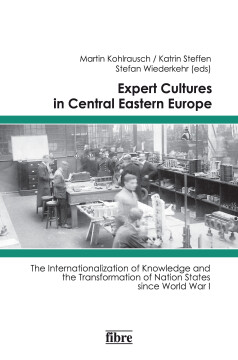Expert Cultures in Central Eastern Europe

BOOK
Cite BOOK
Style
Format
Expert Cultures in Central Eastern Europe
The Internationalization of Knowledge and the Transformation of Nation States since World War I
Editors: Kohlrausch, Martin | Steffen, Katrin | Wiederkehr, Stefan
Einzelveröffentlichungen des Deutschen Historischen Instituts Warschau, Vol. 23
(2010)
Additional Information
Book Details
Abstract
Das 20. Jahrhundert war das Jahrhundert des Experten. Der Aufstieg des Experten als eines speziellen Typus des beruflich qualifizierten Individuums war das Ergebnis zunehmender Verwissenschaftlichung von Wirtschaft, Gesellschaft und Politik. In seiner öffentlichen Funktion handelt der Experte stets im Spannungsfeld zwischen einem universellen Verständnis von Wissenschaft und den politischen Anforderungen, die der Nationalstaat an ihn stellt.Der vorliegende englischsprachige Band fragt nach dem Schicksal des Experten in Ostmitteleuropa vom Ende der dynastischen Imperien nach dem Ersten Weltkrieg bis zum Untergang des Kommunismus. Diese multiethnische Region mit ihrer gebrochenen Tradition von Staatlichkeit und politischen Systemen bildet ein ideales Fallbeispiel, um die komplexen Beziehungen zwischen transnationaler Kooperation und nationaler Orientierung im Handeln von Experten herauszuarbeiten.The 20th century can be described as the century of the expert. The emergence of the expert as a specific type of professionally qualified individual was a result of the growing scientification of economy, society and politics. In his public function, the expert always operates between a universalist understanding of science and the politically defined requirements of the nation state.This volume examines the fate of the expert in Central Eastern Europe from the breakdown of the dynastic empires after World War I to the end of Communism. This multiethnic region with its turbulent tradition of statehood and changing political systems provides an ideal case to reveal the complex relationship between the transnational cooperation among experts on the one hand and their national orientation on the other.
Table of Contents
Chapters
Expert Cultures in Central Eastern Europe
In: Expert Cultures in Central Eastern Europe (2010), pp. 9–30
Experts or Impostors?
In: Expert Cultures in Central Eastern Europe (2010), pp. 31–39
Planning and the ‘Techno-Corporatist Bargain’ in Western Europe and the United States, 1914–44
In: Expert Cultures in Central Eastern Europe (2010), pp. 43–61
Mimicry in a Multiple Postcolonial Setting
In: Expert Cultures in Central Eastern Europe (2010), pp. 63–84
‘The Nation is Technological’
In: Expert Cultures in Central Eastern Europe (2010), pp. 85–104
People’s Cars and People’s Technologies
In: Expert Cultures in Central Eastern Europe (2010), pp. 105–124
Polish Economic Circles and the Question of the Common European Market after World War I
In: Expert Cultures in Central Eastern Europe (2010), pp. 127–144
How to Run a State
In: Expert Cultures in Central Eastern Europe (2010), pp. 145–159
Languages and Politics of International Scientific Communication in Central Eastern Europe after World War I
In: Expert Cultures in Central Eastern Europe (2010), pp. 161–177
Serving Two Dictators
In: Expert Cultures in Central Eastern Europe (2010), pp. 181–198
In a State of Technological Subjection
In: Expert Cultures in Central Eastern Europe (2010), pp. 199–221
Cooperation across the Iron Curtain
In: Expert Cultures in Central Eastern Europe (2010), pp. 223–239
Beyond the Iron Curtain
In: Expert Cultures in Central Eastern Europe (2010), pp. 241–262
List of Abbreviations
In: Expert Cultures in Central Eastern Europe (2010), pp. 265–268

















